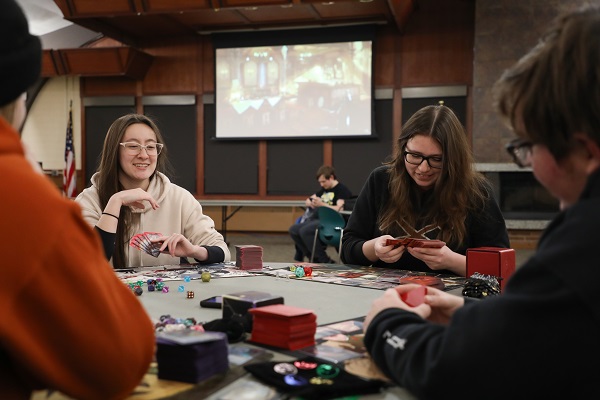Dungeons, Dragons, and Diggers offers fun creative space for Montana Tech students

Most of Jade Uriarte and Gavin Rahl’s time at Montana Technological University is spent delving deep into the world of STEM.
Jade, a cellular and molecular biology junior from Stevensville, has a packed schedule of classes like immunology, genetics, and organic chemistry.
Rahl, an environmental engineering senior from Stevensville, is focused on soil and subsurface remediation, air pollution, and wastewater treatment.
But for a short time each semester, the pair escape the humdrum of assignments as they lead one of the most popular clubs on campus, Dungeons, Dragons, and Diggers, and delve into numerous imaginary realms.
“The main purpose of the club is to get people sorted into groups for D&D or whatever tabletop games they are interested in,” said club president Uriarte. “We also host a couple of game nights each semester. With such a small campus, it’s good to form a community of people with similar interests.”
Dungeons and Dragons is a fantasy role-player game created in the 1970s. More than 50 million people have interacted with the game since its creation, according to its publisher, and it experienced a huge surge in popularity throughout the pandemic.
Uriarte and Rahl both became acquainted with the game in high school.
“I like it a lot because I enjoy fantasy,” Uriarte said. “For me it’s a creative outlet. At Tech we don’t have many liberal arts classes like pottery or art, so it’s a way to get creative.”
In Dungeons and Dragons, a universe is created by a group leader called the dungeon-master and group members. Members of the party create their characters and embark on epic quests together where they face challenges, manage goals together, and encounter every type of fantasy realm thinkable in a multiverse that spans from the mythic lands of Ancient Greece to outer space.
Rahl serves as a dungeon-master, requiring that he prepare for the numerous paths players may want to take.
“When I prep things for a session, I don’t always 100% flesh everything out, and I use forms of improv as we go along,” Rahl said. “Sometimes you can make the most detailed plan, and then your players go and try to stare at a magical door for hours.”
Uriarte chimes in that “the first rule is that none of the other rules matter. They are rough guidelines, but they are not set in stone.”
At a STEM university, that means students test the boundaries regularly.
“It’s a very fun cooperation,” Uriarte said. “It boils down to problem-solving. At a STEM college, students are going to be very interested in a game based on problem-solving.”
Sometimes, players try to test the bounds of what they learn in classes.
“How can we utterly break physics?” is a theme some on-campus players have explored.
The club has more than 40-45 members. The members break into their own, smaller sessions. Some groups move online. Some groups have continued in the virtual space, even though members have graduated and moved on to work and live in other states. Players use their imaginations, personalities, and voices to make sessions fun.
“Some people create the most serious characters for their campaign,” Uriarte said. “Others may say ‘here’s my goblin named Teapot who bakes cookies for everyone.’”
Game nights often attract more than twenty students at a time.
“We don’t always play D&D,” Uriarte said. “Sometimes we just want a group of like-minded people to hang out with and relax.”
The club welcomes everyone.
“The one thing that I always try to push forward is that we are probably one of the most open clubs on campus, and if you want to hang out and have fun, the D&D Club can provide that,” Rahl said. “It’s a really great way to make more personable connections, especially for introverts.”
Some players get deep into character by trying their hand at voice acting and impersonation.
“It creates a fun environment where you can use voice impersonations,” Rahl said. “I’m terrible with voices but I still try. If I give the most heinous-sounding voice, at least it will get a laugh.”
Uriarte says she isn’t big on impersonation, but uses characters completely opposite of her real-life persona to make things more fun.
“I wanted to play the biggest, buffest character there is, because that’s not me in real life,” Uriarte said.
Rahl cautions folks who may have seen popular Dungeons and Dragons media, like “Critical Role,” which professionals voice and has a huge following.
“They are professionals doing this for a living,” Rahl said. “You can have infinitely more fun with it if you throw out some of the perfectionist ideals that are portrayed in some D&D media.”
The club provides a perfect place to do that, and there’s almost always a group of people students can find to help fit their busy schedules. Rahl’s sessions have lasted from two hours to 12 hours of continuous play.
“Even if you have a difficult major and don’t have a lot of time, there’s generally a time you can find on the weekend, even if it’s a couple of hours,” Rahl said.
“It’s a great way to interact with people you wouldn’t interact with outside of your classes,” Uriarte added.
For more information about joining contact Uriarte at juriarte@mtech.edu or Rahl at grahl@mtech.edu.